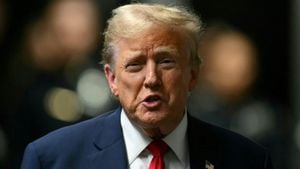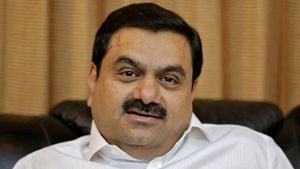Recent military actions have reignited tensions between Russia and Ukraine, signaling potential escalations on both sides. On November 22, the Kremlin launched its first attack using the newly developed hypersonic missile, the Oreshnik, targeting Ukrainian military sites as both countries reach new phases of intensity within the conflict.
The Kremlin's justification for the attack came from spokesperson Dmitry Peskov, who framed it as a direct response to Ukraine's usage of Western-supplied missiles for strikes on Russian territory. "The reckless decisions and actions of Western countries producing missiles and supplying them to Ukraine cannot remain without reaction from the Russian side," Peskov asserted. This determination came just after President Vladimir Putin expressed his intent to demonstrate Russia's military capabilities, particularly as Ukraine utilized U.S.-made ATACMS and British Storm Shadow missiles within its offensive.
It's significant to note how the Kremlin views the Ukraine strikes as proof of direct involvement from the West, which creates a precarious atmosphere. Moscow has alleged, with some conviction, the necessity of NATO's military personnel being involved, as Ukraine's capabilities alone weren't sufficient for such sophisticated missile operations.
Putin, during his remarks, pointed to Dnipro, where Russia aimed its newly developed capabilities. The Pivdenmash missile and space rocket enterprise was among the facilities hit. Russian authorities claimed all warheads reached their targets successfully, marking their first operational use of his hypersonic missile with conventional warheads. Yet, this was not without consequence; Ukrainian President Volodymyr Zelenskiy regarded the missile activities as tantamount to “a clear and severe escalation,” making international condemnation imperative for such actions.
Despite military operations ramping up, Peskov stated Moscow's openness for dialogue, even with the growing tension. He called for recognition of Putin's previously stated concerns about U.S. involvement and Ukrainian launches deep within Russian territory. He voiced concerns of escalation, reminding the West it could alter the very nature of the conflict.
Directly related, President Zelenskiy announced Ukraine is accelerating its air defense development to confront these new risks posed by Russia's military advancements. He emphasized the need for global support against what he termed as acts of international aggression and testing of new weaponry through terrorism. Chief among Zelenskiy's calls has been the need for enhanced air defense systems, which his government is negotiating with foreign partners.
"When someone starts using other countries not only for terror, but also for testing their new missiles through acts of terror, then this is clearly an international crime," Zelenskiy warned, underlining the drastic need for international unity against the aggressions exhibited by Russia.
Overall, as hostilities escalate and both nations respond with advanced military capabilities, the international community's role becomes increasingly implicated. Accusations of reckless military maneuvers dominate the dialogue, pushing for retaliatory actions and new military enhancements on both sides. It paints a grim picture of the rapidly shifting situation.
While military operations have heated up, Zelenskiy's call for vigilance reflects the seriousness with which Ukraine sees the current dynamics. The funding and supply from Western allies have become life-sustaining for Ukraine's military efforts—an aspect Peskov has previously noted with rising frustration.
With tensions flaring and renewed military activity on both sides, experts are left pondering: what steps can the global community take to mitigate the ensuing conflict? Continued military support for Ukraine seems almost inevitable, yet every action appears laden with the risk of provoking another round of retaliatory responses from Russia.
This latest chapter adds to the 33-month war, marking another evolution—one where advanced military technologies come to the forefront, adjusting global security perceptions and strategies amid rising hopes for de-escalation.
Will dialogue and diplomatic efforts be enough to ease these tensions, or are both sides strapped for continuous confrontation? Only time will tell, as the world watches the narrative of Russia’s military actions against Ukraine develop with each passing day.



